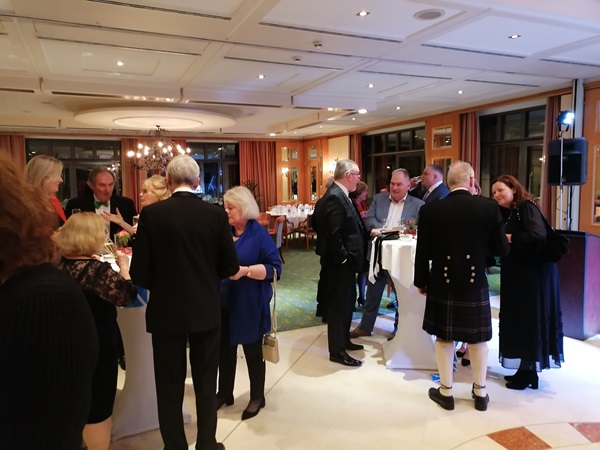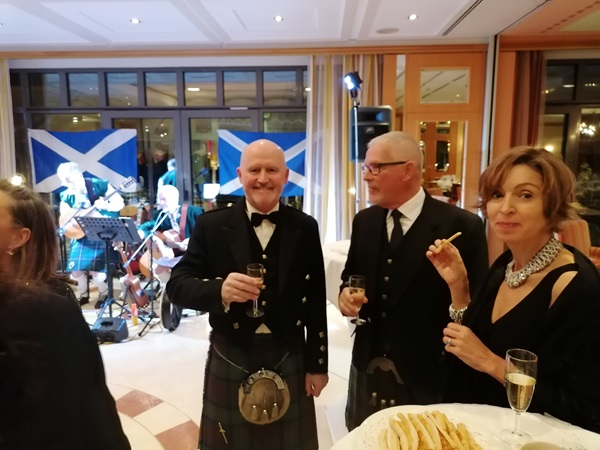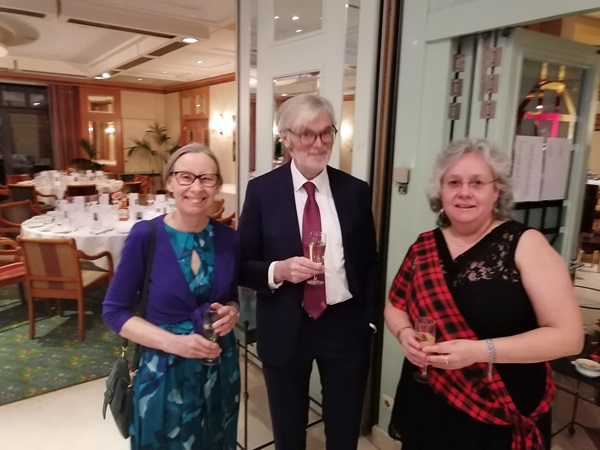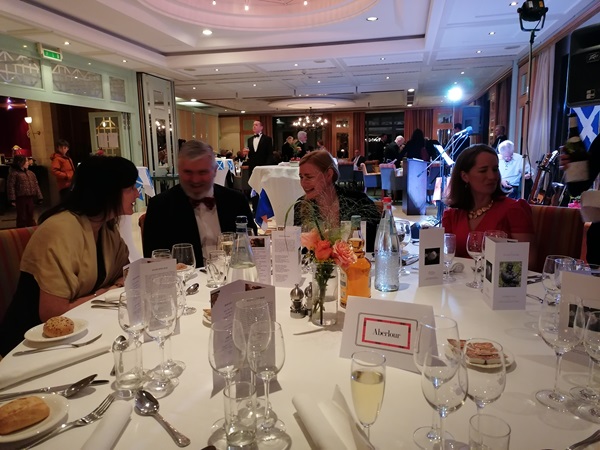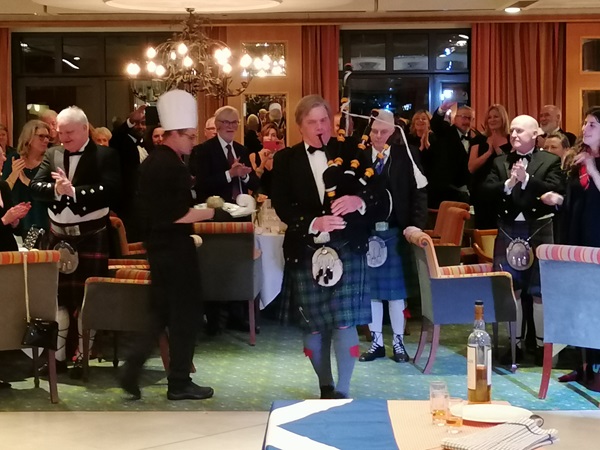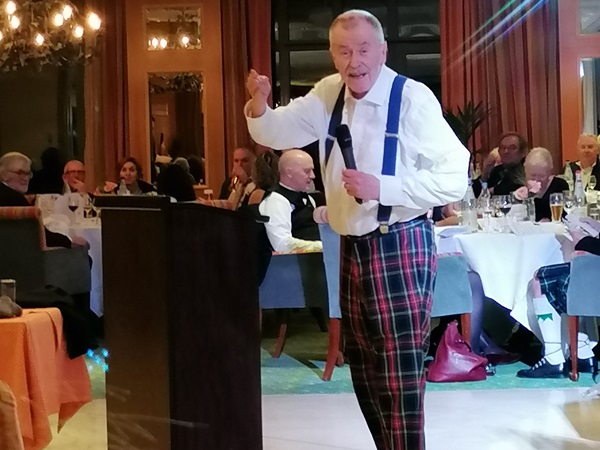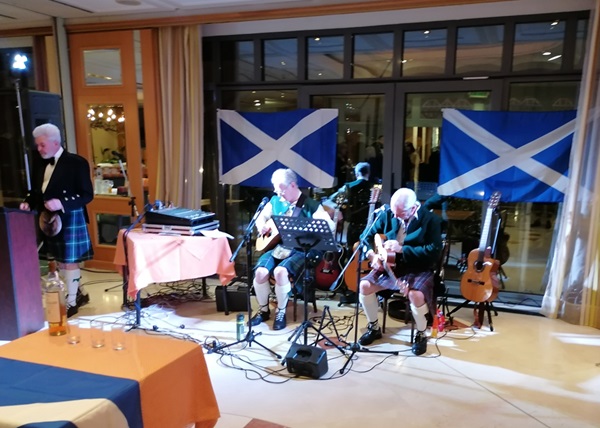 Credit: Jim Kelly
Credit: Jim Kelly
On Friday 26 January 2024, some 100 people gathered at the Hotel Parc Belair in Luxembourg City to celebrate the birthday of Scotland's national poet, Robert Burns (born 25 January 1759; died 21 July 1796).
This celebration of Burns was one of many which are held worldwide on or around 25 January each year; this Burns Night celebration, however, was of specific note, as it was the 40th such event to be held in Luxembourg.
Robert Burns, often referred to as Rabbi, is also known as the "Plowright Poet" due to his working on his father's farm until he was fifteen years old.
Burns was not just an impressive poet but also a prolific writer of songs ("Green Grow The Rushes, O") and he was seen as a "lover", fathering many children by four different women, as well as an excise agent and, in his later years, a darling of Edinburgh society.
Burns' poetry creations have stood the test of time and include some famous ones, namely: "Old Lang Syne", "A Red, Red Rose", "To a Mouse" and "Tam o'Shanter".
To the people of Scotland and for Scots across the world, the works and life of Robert Burns hold as great a place in their life as do the works of Shakespeare for the English.
The evening started with a standing reception as the guests arrived with the men in evening dress sporting their tartan kilts, or occasionally tartan "trews" (trousers), with many ladies having tartan sashes. It should be noted that the tartans reflected the clan or "sept" to which the wearers or their ancestors belong.
A little after 20:00, the master of ceremonies, David Young, who was one of the founders of the Luxembourg Burns Night Suppers, welcomed the guests and regaled them with the story of how Burns Night Suppers (in 1982) came to happen in Luxembourg and welcome some nine of the participants of the first such supper to this 40th edition. Included among this original nine was once again piper for the night, Anthony Orr, who has been the piper for all 40 suppers here in Luxembourg.
Before the food was served, the Burns written Selkirk Grace was given by Anthea MacDonald.
The first course was a meaty Cock-a-Leekie soup (translation: chicken and leek). Before the main course of Haggis, Neeps and Tatties (haggis, mashed turnip and mashed potato), three traditional actions happen.
The first is the piping in the haggis, wherein the Pipe Master playing on his bagpipes leads the head chef carrying a silver platter bearing a freshly cooked haggis, on a tour around the room. The second is after the platter is placed on a table before the assembled guests a small tot of whisky is drunk by the piper, chef and toaster (Paul Barker). The third part of the ceremony of the haggis is that the toaster delivers with many actions, Burns famous "Ode to a Haggis", which this year certain attendees felt was probably the finest this author has ever seen and heard.
After the haggis ceremony, the hotel serving staff brought the plates of Haggis, Neeps and Tatties; for those who were hungry, their second servings were offered and, given the panorama of empty plates, it appeared that once again the cooking staff of the hotel were at the top of their game. A pleasant desert of ice cream and sorbet helped round off what attendees described as a "wonderful" meal.
The evening continued in traditional fashion with a delivery of the Immortal Memory by Mags Fearns, in which she shared her passion for Burns from an early age and threw a spotlight on some of the significant aspects of the poet's life, brief though it may have been.
Then came an interesting pair of events. The first is given by a man and is the "Toast to the Lassies", in which, using some references to Burns, the speaker seeks to extol the qualities and virtues of "lassies" (women) albeit in a somewhat tongue-in-cheek manner, and this year's by Richard Marshall was well received. The second is the chance for one of the "lassies" to respond to the "laddies" (men) and, as is usual, the responding "Toast to the Laddies" allows the speaker a chance to point out not just the finer points of the laddies but also some of their less admirable aspects of behaviour, all delivered in a humorous manner with some helpful quotes from Burns. This year, Eimer Fahy did a fine job with much laughter ensuing.
As this event is to celebrate Robert Burns, the last formal part of Burns Night is a recitation from memory of "Tam o'Shanter", delievered by David Sillars. After the latter gave his closing remarks, all the guests joined in singing the song "Scots Wha Hae", which Robert Burns wrote in 1793, in the form of a speech given by Robert the Bruce before the Battle of Bannockburn.
Now all that remained was to clear the floor and hold a "Ceilidh" (Scottish dances) under the tutelage and control of Stephanie Robertson.
Throughout the night, the music and songs was provided by Heelster Gowdie who had flown over from Scotland especially for this event. By 01:00, many were still dancing and drinking, thus confirming yet another successful Burns Supper in Luxembourg.

